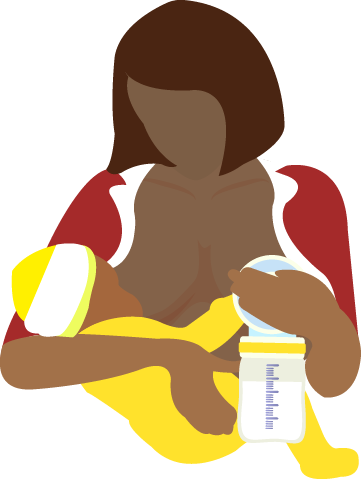PHYSICAL ACTIVITY AFTER A C-SECTION
Resume physical activities gradually after a C-section. Ideally, someone should be on hand to help you in the first two
weeks. This will make your recovery easier (Gagnière, Diane et al., p. 35, 2001).
Some of our suggestions include:
- Support your incision with your hand or a cushion when you cough or change position;
- Avoid climbing stairs frequently;
- Do not lift objects that weigh over 20 pounds / 9 kg in the first month;
- Avoid housework such as vacuuming and any other activity that engages the abdominal muscles;
- Resume driving a car once you feel safe;
- Engage in mild exercise, such as walking;
- Wait for your physician’s approval at your follow-up appointment at about the sixth week before you
resume more strenuous activities.
DIET
After your child is born, a balanced, varied diet is recommended. Weight-loss diets
are not recommended during the post-partum period or at any time while you are breastfeeding. Give yourself one
year to slim down to your pre-pregnancy weight.
SLEEP AND REST
It is perfectly normal to feel fatigued and exhausted after giving birth. It may take several weeks before your energy
level returns to normal. Regular rest periods are recommended; try to nap while your baby is sleeping (Régie régionale de la santé et des services sociaux (RRSSS), Montréal Centre, p. 19, 2003).
In the first few weeks, you will focus on caring for your newborn. Gradually, you will resume your normal activities.
Do not hesitate to ask for help when you need it. Plan to have someone around to help you in the first few weeks if
possible.
PERSONAL HYGIENE
You may bathe or shower at any time after a vaginal birth or C-section.
The bathtub must be clean, and avoid using scented oils or foams which can cause irritation.
POSTNATAL EXERCISES
You can begin some exercises, like Kegel exercises, as early as the day after the birth.
Two weeks after a vaginal birth and six weeks after a C-section, you can begin an exercise program.
POSTPARTUM SEX
Coupless can begin having sex again whenever they decide the time is right.
Bear in mind that exclusive breastfeeding for the first six weeks is a method of contraception. If this does not apply to
you, the use of a condom and spermicide is recommended if you start having sex again before your first medical visit.
MENSTRUATION
If you are not breastfeeding, your period will begin again in four to eight weeks after the birth.
For breastfeeding mothers, it may take several months for your period to return, even after you stop breastfeeding.
Your first few periods may be heavier than normal. Their normal flow will resume after a few cycles.
EMOTIONAL WELLBEING
The birth of a child is a positive but emotional experience that can sometimes be difficult. There is nothing unusual
about feeling sad, angry, irritable, or overwhelmed by all of the feelings associated with your new role as mother, or
to have crying episodes commonly called the “baby blues”. This emotional upset is normal and affects anywhere from
50% to 80% of women. These feelings usually disappear without treatment within two weeks. However, if symptoms
worsen or persist and you feel unable to cope with daily life and your baby’s care, you may be experiencing a post-
partum depression. In this case, it is very important to consult a health care professional. If a mother refuses to
discuss the matter or feels uncomfortable about doing so, people close to her are encouraged to voice their concerns
to a health care professional.
Here are a few tips to help you through this adjustment period:
you, the use of a condom and spermicide is recommended if you start having sex again before your first medical visit.
MENSTRUATION
If you are not breastfeeding, your period will begin again in four to eight weeks after the birth.
For breastfeeding mothers, it may take several months for your period to return, even after you stop breastfeeding.
Your first few periods may be heavier than normal. Their normal flow will resume after a few cycles.
EMOTIONAL WELLBEING
The birth of a child is a positive but emotional experience that can sometimes be difficult. There is nothing unusual
about feeling sad, angry, irritable, or overwhelmed by all of the feelings associated with your new role as mother, or
to have crying episodes commonly called the “baby blues”. This emotional upset is normal and affects anywhere from
50% to 80% of women. These feelings usually disappear without treatment within two weeks. However, if symptoms
worsen or persist and you feel unable to cope with daily life and your baby’s care, you may be experiencing a post-
partum depression. In this case, it is very important to consult a health care professional. If a mother refuses to
discuss the matter or feels uncomfortable about doing so, people close to her are encouraged to voice their concerns
to a health care professional.
Here are a few tips to help you through this adjustment period:
- Openly discuss your feelings and concerns with your spouse or a loved one;
- Have your spouse help out with caring for the baby;
- Accept help from people close to you;
- Engage in activities outside your home;
- Take care of yourself: get dressed, do your hair and put on make-up;
- Take time to rest;
- Talk with other parents;
- Give yourself time to adjust to your new life.
Source: Hôpital Montfort.




